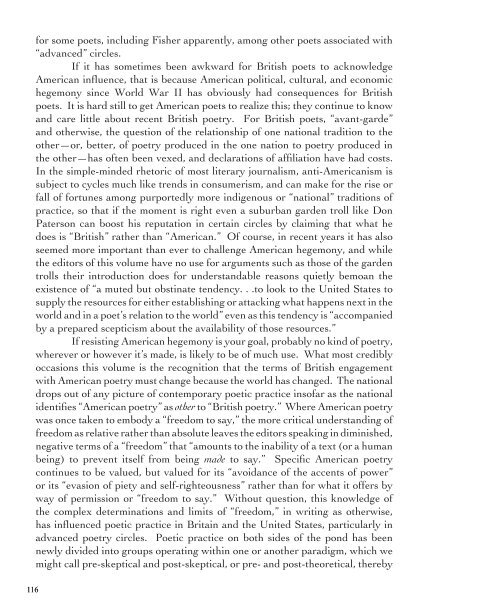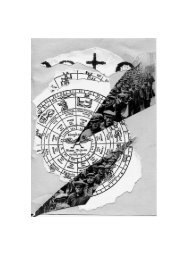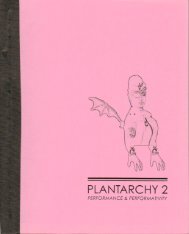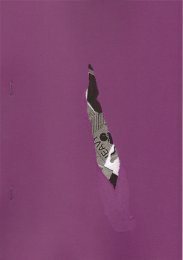P L A N T A R C H Y 2 - Critical Documents
P L A N T A R C H Y 2 - Critical Documents
P L A N T A R C H Y 2 - Critical Documents
Create successful ePaper yourself
Turn your PDF publications into a flip-book with our unique Google optimized e-Paper software.
116<br />
for some poets, including Fisher apparently, among other poets associated with<br />
“advanced” circles.<br />
If it has sometimes been awkward for British poets to acknowledge<br />
American influence, that is because American political, cultural, and economic<br />
hegemony since World War II has obviously had consequences for British<br />
poets. It is hard still to get American poets to realize this; they continue to know<br />
and care little about recent British poetry. For British poets, “avant-garde”<br />
and otherwise, the question of the relationship of one national tradition to the<br />
other—or, better, of poetry produced in the one nation to poetry produced in<br />
the other—has often been vexed, and declarations of affiliation have had costs.<br />
In the simple-minded rhetoric of most literary journalism, anti-Americanism is<br />
subject to cycles much like trends in consumerism, and can make for the rise or<br />
fall of fortunes among purportedly more indigenous or “national” traditions of<br />
practice, so that if the moment is right even a suburban garden troll like Don<br />
Paterson can boost his reputation in certain circles by claiming that what he<br />
does is “British” rather than “American.” Of course, in recent years it has also<br />
seemed more important than ever to challenge American hegemony, and while<br />
the editors of this volume have no use for arguments such as those of the garden<br />
trolls their introduction does for understandable reasons quietly bemoan the<br />
existence of “a muted but obstinate tendency. . .to look to the United States to<br />
supply the resources for either establishing or attacking what happens next in the<br />
world and in a poet’s relation to the world” even as this tendency is “accompanied<br />
by a prepared scepticism about the availability of those resources.”<br />
If resisting American hegemony is your goal, probably no kind of poetry,<br />
wherever or however it’s made, is likely to be of much use. What most credibly<br />
occasions this volume is the recognition that the terms of British engagement<br />
with American poetry must change because the world has changed. The national<br />
drops out of any picture of contemporary poetic practice insofar as the national<br />
identifies “American poetry” as other to “British poetry.” Where American poetry<br />
was once taken to embody a “freedom to say,” the more critical understanding of<br />
freedom as relative rather than absolute leaves the editors speaking in diminished,<br />
negative terms of a “freedom” that “amounts to the inability of a text (or a human<br />
being) to prevent itself from being made to say.” Specific American poetry<br />
continues to be valued, but valued for its “avoidance of the accents of power”<br />
or its “evasion of piety and self-righteousness” rather than for what it offers by<br />
way of permission or “freedom to say.” Without question, this knowledge of<br />
the complex determinations and limits of “freedom,” in writing as otherwise,<br />
has influenced poetic practice in Britain and the United States, particularly in<br />
advanced poetry circles. Poetic practice on both sides of the pond has been<br />
newly divided into groups operating within one or another paradigm, which we<br />
might call pre-skeptical and post-skeptical, or pre- and post-theoretical, thereby





